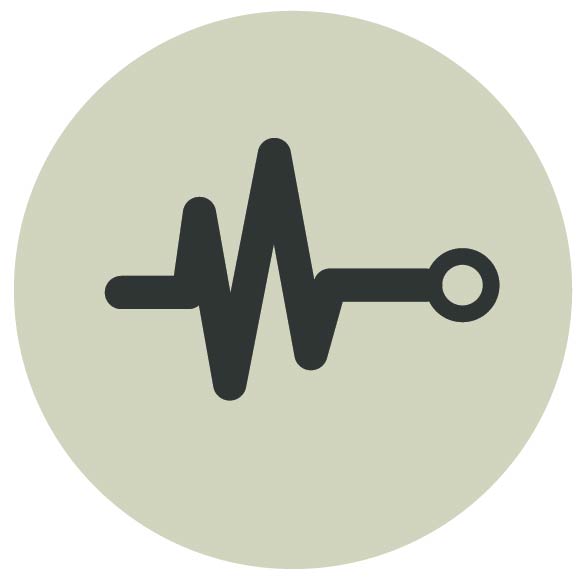Crohn's Disease is an inflammatory bowel disease that causes inflammation of any part of the gastrointestinal tract (GI tract). It causes ulceration and inflammation, which affects the body’s ability to digest food, absorb nutrients and eliminate waste. It is a life-long condition with periods of good health and times when symptoms are more active. It is different for everyone with many people experiencing just a few flare-ups, while for others, it is a more severe disease.
Crohn’s Disease belongs to a group of conditions known as inflammatory bowel diseases, or IBD, the other being Ulcerative Colitis. It is named after Dr. Burrill B. Crohn, who first described the disease in 1932.
The content on this page is provided solely for information purposes and provides an overview of the subject matter covered. It is not a substitute for professional medical advice, diagnosis or treatment. If you think you have crohn's, please seek further information. The information on this page is subject to change without notice.
Crohn's is an invisible disability
 Most people with Crohn’s disease will live normal active lives
Most people with Crohn’s disease will live normal active lives Smoking increases your risk of developing Crohn’s disease
Smoking increases your risk of developing Crohn’s disease 30% of patients are diagnosed under the age of 21
30% of patients are diagnosed under the age of 21 1 of 2 inflammatory bowel diseases The other is Ulcerative Colitis
1 of 2 inflammatory bowel diseases The other is Ulcerative Colitis 1 in every 650 people in the UK have Crohn's
1 in every 650 people in the UK have Crohn's 11% of Crohn’s patients will experience severe disease activity
11% of Crohn’s patients will experience severe disease activity Between 5 and 20 percent of people with Crohn’s have a first-degree relative who also has Crohn's
Between 5 and 20 percent of people with Crohn’s have a first-degree relative who also has Crohn's Crohn's Disease stats & facts poster Download here
Crohn's Disease stats & facts poster Download here
A person’s immune system usually attacks and kills harmful substances and germs and harmless bacteria present in the gut are protected from attack. In people with Crohn's, these harmless bacteria are mistaken for foreign invaders and the immune system responds and causes an inflammation which does not go away.
Crohn’s can affect any part of the gastrointestinal tract (GI tract) from the mouth to the anus, but most often develops in the last part of the small intestine (known as the ileum) or the colon. The areas of Inflammation often occur in patches with sections of normal gut in between. As well as the lining of the bowel, Crohn’s can also affect the entire thickness of the bowel wall.
Crohn's Disease can occur at any age but is most commonly diagnosed in people between the ages of 10 and 40. It tends to run in families, so first-degree relatives, such as a parent, child or sibling have an increased chance of developing Crohn’s.
Symptoms:
Crohn's is a chronic condition and people's experience of Crohn's is different for everyone. Symptoms depends on which part of the GI tract is affected. Some experience constant symptoms while for others, symptoms may flare-up every few weeks or months. Symptoms include:
- diarrhoea (sometimes with blood)
- abdominal pain
- urgent and/or frequent need to go to the toilet
- mouth ulcers
- constipation, leading to bowel obstruction
- anaemia
- nausea
- lack of appetite and weight loss
- low energy and fatigue
Symptoms beyond the GI tract may include:
- redness or pain in the eyes, or vision changes
- mouth sores
- swollen and painful joints
- skin complications, such as bumps, sores, or rashes
- fever
- night sweats
- loss of normal menstrual cycle
- osteoporosis
- kidney stones
Types of Crohn's
Terminal ileal and ileocaecal
ThIs it one of the most common forms of Crohn’s. It affects the ileum which is the last part of the small intestine and the colon.
Small bowel
This type affects the small bowel.
Colonic (Crohn's Colitis)
ThIs it a common form of Crohn's and occurs in the colon (large intestine or large bowel). It is not the same Ulcerative Colitis.
Gastroduodenal
This occurs in the upper part of the GI tract: the oesophagus, stomach or duodenum.
Perianal
Crohn’s in the area around the anus (back passage) can occur on its own or at the same time as inflammation in other parts of the body. It is quite common, and some people notice perianal symptoms before they develop intestinal symptoms.
Oral Crohn’s
Crohn’s can occasionally affect the mouth.
Is it the same as Irritable Bowel Syndrome (IBS)?
IBS is a different condition and does not cause the type of inflammation that Crohn's does and there is no blood loss with IBS. Some of the symptoms are similar: abdominal pain, bloating and diarrhoea or constipation.
Effects on and challenges faced in daily life
- lack of availability of accessible and adequate toilet facilities, including when travelling on public transport, attending meeting or events
- concern about job and employment prospects as a result of having Crohn's
- discrimination in the workplace
- planning can be challenging as symptoms aren't always predictable
Assistance and support you can offer
Don't judge: living with Crohn's is difficult enough without being judged
Find out about Crohn's to be aware that the person with Crohn's:
- has access to accessible and adequate toilet facilities: there can be a real need to get to a toilet without delay. Consider this when planning meetings or events
- may need to take additional toilet breaks or use a hot water bottle to relieve stomach cramps
- may need to re-arrange or cancel plans depending on the severity of their symptoms
Be aware that some triggers such as food or stress can aggravate Crohn's symptoms
Information on workplace considerations are only available to some Sunflower Members. Find out more about the Sunflower Membership plans here.
Sources:
NHS: https://www.nhs.uk/conditions/crohns-disease/
Crohn's and Colitis: https://www.crohnsandcolitis.org.uk/about-crohns-and-colitis/publications/crohns-disease
IBD News Today: https://ibdnewstoday.com/2017/04/13/ten-facts-and-stats-about-crohns-disease/#:~:text=Here%20are%20some%20more%20interesting%20facts%20and%20statistics,a%20first-degree%20relative%20who%20also%20has%20the%20disease.
Health and Work: https://healthandwork.org.uk/crohns-overview/
Healing Well:https://www.healingwell.com/articles/post/support-someone-with-crohns-or-colitis
Look out for these Sunflower icons

I have accessibility needs Please ask me what they are I may need urgent access to the closest toilet facility Please assist me without questioning
I may need urgent access to the closest toilet facility Please assist me without questioning I may need more time
I may need more time I need a quiet/safe place
I need a quiet/safe place
Is there a safe/quiet space I can use? I may need a place to sit down and rest
I may need a place to sit down and rest I have a hidden disability
I have a hidden disability
The content on this page is provided solely for information purposes and provides an overview of the subject matter covered. It is not a substitute for professional medical advice, diagnosis or treatment. If you think you have Crohn's Disease, please seek further information. The information on this page is subject to change without notice.


